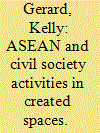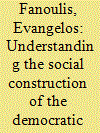| Srl | Item |
| 1 |
ID:
131895


|
|
|
|
|
| Publication |
2014.
|
| Summary/Abstract |
The Association of Southeast Asian Nations (ASEAN) has recently made numerous commitments to engage civil society organizations (CSOs) in its governance practices. However, the opportunities created offer limited means for CSOs to contest policy as a result of strict controls over who can participate and the forms of participation permitted. Activists have consequently pursued their agendas outside of spaces sanctioned by ASEAN through 'created spaces,' such as conferences organized parallel to official summits. However, this form of political participation has limited potential to influence official processes because despite its independence, these activities are still structured in relation to ASEAN practices. The ineffectual nature of CSO advocacy despite ASEAN's people-orientated shift has been documented, however explanations for this trend remain limited. This article applies the modes of political participation framework that acknowledges the role of intergovernmental organizations in structuring spaces for civil society participation and, in doing so, shaping the contribution that CSOs can make. Through an examination of the regulations and practices that govern CSO participation in both ASEAN-sanctioned and independent spaces, it argues that spaces for CSO participation are structured to prevent CSOs from contesting policy, suggesting that ASEAN's shift to widen participation is directed towards legitimating its reform agenda. Hence, ASEAN's claim of becoming 'people oriented' must be considered in recognition of the limiting effect its engagement practices have on CSOs' ability to advance alternative agendas.
|
|
|
|
|
|
|
|
|
|
|
|
|
|
|
|
| 2 |
ID:
134067


|
|
|
|
|
| Publication |
2014.
|
| Summary/Abstract |
Drawing upon the Foucauldian approach of governmentality, this article argues that the democratic deficit of the EU's Common Security and Defence Policy (CSDP) is the outcome of how governmental power flows in CSDP governance and more precisely within the governance practices of the policy. To support this argument, the narrative explores the secrecy/confidentiality, informality and normalisation of the exercise of governmental power in a concrete example of CSDP governance, the recent pooling and sharing initiative. The example shows that the official makers of CSDP pursue efficiency of governance to the detriment of the democratic quality of the policy, and this is related with the productive and expansive rationality of governmental power flowing in and between the EU institutions. Despite the fact that governmentality usually links to structural explanations, allowing limited space for the role of agency in politics, the article concludes with reflections on how the political agency of the governing EU political subjects contributes to the social construction of the democratic deficit of CSDP.
|
|
|
|
|
|
|
|
|
|
|
|
|
|
|
|